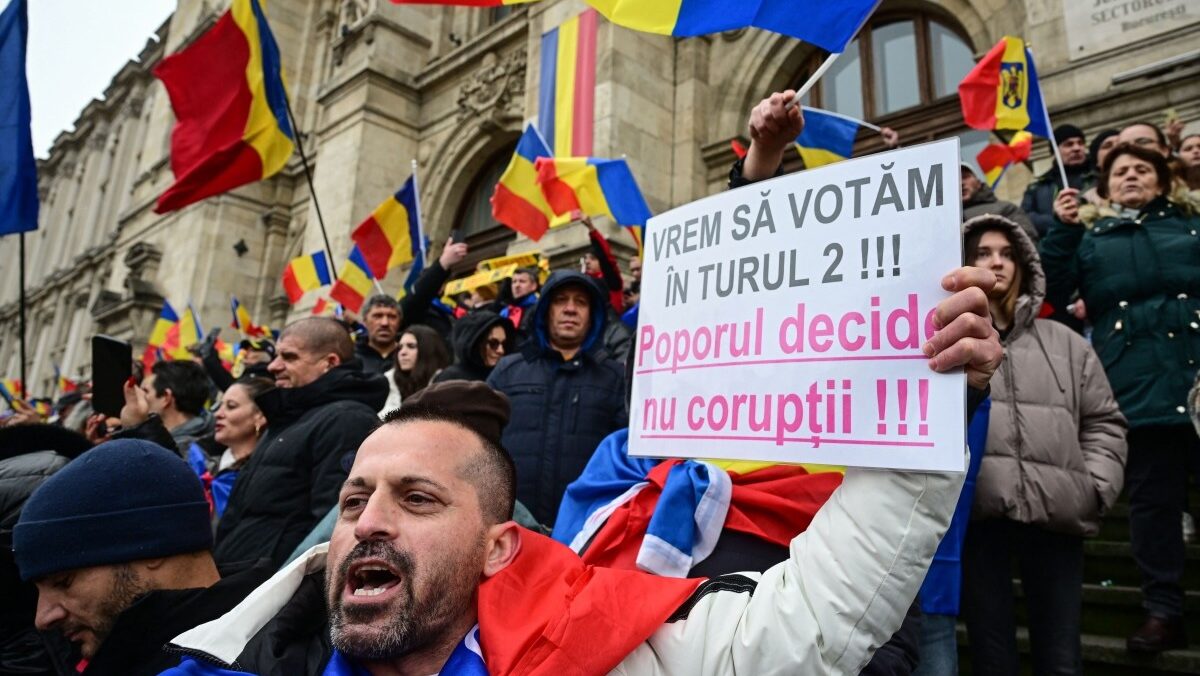After weeks of delays, the Romanian government has finally announced the date for a rerun of the presidential elections, which were annulled by the constitutional court last month over (still unproven) allegations of electoral interference by both domestic and foreign actors.
The first round of the new elections is scheduled for May 4th, with a runoff following on May 18th. Opposition parties criticized the timing, arguing that there’s no reason to hold the elections so late. They have accused the establishment of using the delay as a strategic move to give itself enough time to build up an effective campaign against the united right-wing nationalist front.
As we previously reported, the constitutional court initially certified, then annulled the first round in December—probably due to political pressure from the then-ruling socialists—after the shocking victory of a little-known, independent right-wing nationalist candidate, Călin Georgescu.
The decision was based on declassified intelligence reports, which alleged that Georgescu’s rise to victory was fueled by several illicit TikTok campaigns paid from shady domestic sources and potentially orchestrated by Russia, although the exact details of what happened still haven’t been thoroughly investigated. There is evidence of Georgescu running an undisclosed political campaign worth nearly a million euros, but there’s no conclusive proof of Russia’s involvement at this point. In fact, one of the campaigns cited by security agencies was later revealed to have been paid by the center-right PNL, one of the current ruling parties.
All three Eurosceptic parties—SOS Romania, POT, and the Romanian nationalist AUR—have united in support of Georgescu, whose name is almost guaranteed to end up on the second-round ballot again.
The court could theoretically ban him from entering due to the undisclosed campaign funds alone, but public trust in democratic institutions is already the lowest it has been in decades, and every step the establishment tries to take against Georgescu will only galvanize his voter base who see him as a symbol of change against the corrupt elite.
All that remained, therefore, was to find a candidate who could beat Georgescu and rally together behind that single person. This, however, has proven to be harder than it sounds.
The centrist government coalition—which includes the two main establishment parties, the social democrat PSD (S&D), the center-right PNL (EPP), and the ethnic Hungarian UDMR/RMDSZ (EPP)—initially put forward a single candidate: PNL’s former Senate President Crin Antonescu. However, it took less than a day for them to backtrack on their choice and instead decide to run future polls that would determine whether they should drop him in favor of either socialist PM Marcel Ciolacu or PNL leader Ilie Bolojan.
Meanwhile, two other candidates are also vying for the pro-EU candidacy in the run-off, despite all so-called ‘democratic’ parties agreeing last year to unite against the ‘far right.’ One of them is Elena Lasconi, leader of the anti-establishment center-right USR (Renew), who came in second place in the annulled election and then accused the PSD of “destroying democracy” by forcing a redo through the socialist-packed court.
The other challenger is Nicușor Dan, the former USR but now independent mayor of Bucharest. Dan managed to anger both the establishment parties and—especially—his former party by commissioning a private poll last week, which revealed that he has a better chance of beating the nationalists than Lasconi.
According to the results, the nationalist Georgescu would win over 40% of the votes in a four-way race, guaranteeing a spot in the run-off. Antonescu, the joint government candidate, would end up in second place with 22-24%, followed by Dan with 16-18% and, last, Lasconi with 7-8%.
The USR leader slammed the mayor’s poll as an attempt to get her to pull out of the race and said she won’t abandon the 1.7 million voters who trusted her last time. At the same time, she criticized the government even before it was revealed that Antonescu might not be their final choice, saying that the establishment plan has always been “gaming the system” so they can give PM Marcel Ciolacu another chance at the presidency, despite the voters firmly rejecting him.
Whether annulling the elections was the right choice, the majority of Romanians agree with the nationalist parties and the USR, who say the move was inherently anti-democratic, regardless of the interference allegations. According to a poll done by the Romanian Institute for Strategic Evaluation (IRES), 62% of respondents believe the court made a mistake, while only 35% think it was right to call off the elections after the first round. The same poll found that in the canceled two-way run-off, Georgescu would have beaten Lasconi by 48% against 29%.
Meanwhile, both the nationalists and the USR continue to demand the reversal of the court decision and that the second round be held as it should have been. Georgescu, who unsuccessfully appealed the decision, invited his supporters to a major protest in front of the Constitutional Court headquarters for Friday, January 10th. The gendarmerie, however, warned that the gathering would be illegal as it wasn’t legally declared to authorities 24 hours before its start.






